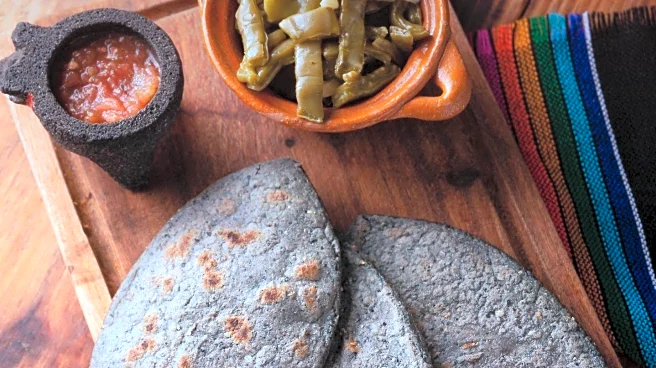What is the story about?
What's Happening?
The Mexican government has banned the sale of acitrón, a candied product made from the endangered biznaga cactus, due to concerns over the species' extinction. Despite the ban, acitrón remains popular in markets like Merced in Mexico City, where vendors continue to sell it illegally to meet consumer demand. Acitrón is a key ingredient in chiles en nogada, a traditional dish associated with Mexican Independence Day celebrations. The biznaga cactus, crucial to the production of acitrón, is facing extinction due to overharvesting, as it grows very slowly and is not viable for farming. Efforts to conserve the cactus are underway at the National Autonomous University of Mexico's botanical garden, where biologists are studying its slow growth and potential for adaptation.
Why It's Important?
The ban on acitrón highlights the tension between cultural traditions and environmental conservation. The continued illegal sale of acitrón underscores the challenge of enforcing conservation laws when cultural practices are deeply ingrained. The extinction threat to the biznaga cactus poses a significant risk to biodiversity and the ecological balance in Mexico. The situation calls for innovative solutions to preserve cultural heritage while protecting endangered species. The adaptation of traditional recipes, such as using alternative ingredients, reflects a growing awareness and responsibility towards environmental sustainability. This issue also raises broader questions about the impact of human consumption on natural resources and the need for sustainable practices.
What's Next?
Efforts to conserve the biznaga cactus are likely to continue, with potential for increased enforcement of the ban on acitrón sales. Biologists and conservationists may explore alternative methods to cultivate the cactus sustainably. The culinary industry might see a shift towards using substitute ingredients in traditional dishes, promoting awareness of environmental issues. Public education campaigns could be launched to inform consumers about the importance of protecting endangered species and the impact of their choices. The government may consider stricter penalties for illegal sales to deter vendors and protect the cactus from further exploitation.
Beyond the Headlines
The acitrón ban and the plight of the biznaga cactus reflect broader ethical considerations regarding the balance between cultural preservation and environmental responsibility. The story highlights the need for cultural adaptation in the face of ecological challenges, encouraging a reevaluation of traditional practices. It also underscores the role of education and innovation in fostering sustainable consumption patterns. The situation serves as a reminder of the interconnectedness of cultural heritage and environmental stewardship, prompting discussions on how societies can evolve to protect both.

















